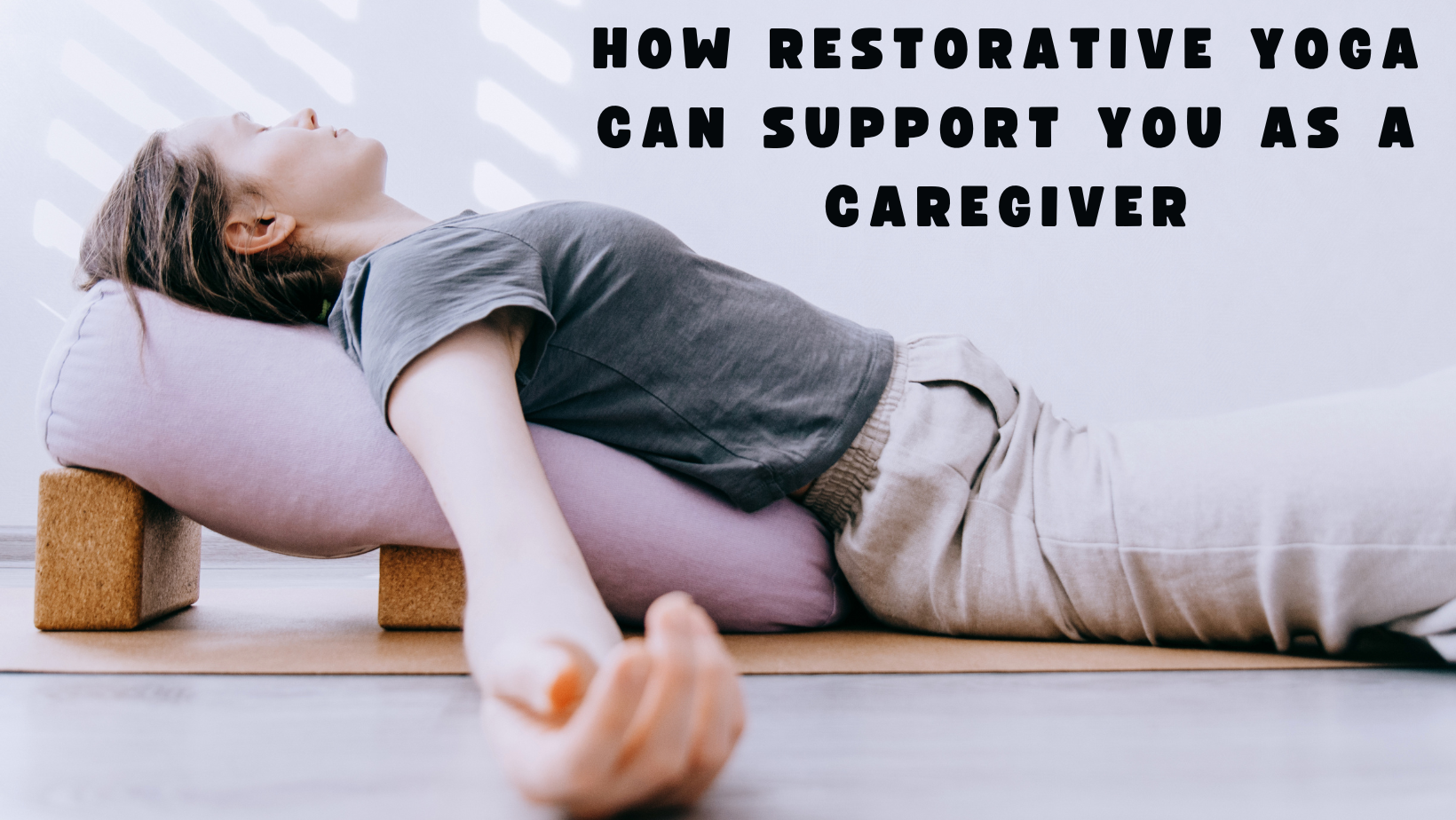How Restorative Yoga Can Support You as a Caregiver

You can’t pour from an empty cup. Take care of yourself first. — Anonymous
At some point in our lives, we all care for someone, whether it’s children, parents, or other loved ones. It’s not an easy job, as any caregiver will tell you. You can find yourself giving and giving until there’s nothing left.
Caring for aging parents can be especially taxing, as we witness those who were once our caregivers and heroes now depending on us for their care. This shift in roles can be a psychological and emotional challenge no one is truly prepared for. The physical and emotional demands can quickly lead to burnout if you don’t carve out time to rest, recharge, and nurture yourself.
One effective way to do this is through restorative yoga.
3 Benefits of Restorative Yoga
- Letting Go of Tension and Stress
Restorative yoga is one of the best ways to help reduce stress levels. In fact, a 2024 study published in Frontiers in Public Health found that regular yoga practice helps individuals experience fewer stress-related disturbances, making it easier to unwind after a long day.
The reason for this, as the study points out, is that yoga encourages mindfulness—focusing on your breath and movements. This practice has been linked to better self-regulation and decision-making, crucial skills for navigating the ups and downs of caregiving. Furthermore, yoga helps lower cortisol levels, the stress hormone that can lead to a range of health issues if left unchecked. [1]
- Improving Sleep Quality
As a caregiver, the demands of caring for others can leave you overwhelmed and sleep-deprived, but restorative yoga can help.
When you practice yoga, you're not only stretching your muscles but also promoting relaxation throughout your body. As a 2013 study found, regular yoga practice can enhance sleep quality by reducing tension and making it easier to unwind at the end of the day. As a result, you may find yourself falling asleep more quickly and enjoying deeper, more restorative sleep. [2]
- Boosting Emotional Health
It’s well-known regular exercise can help boost your mood, lowering stress hormones and increasing endorphins in your blood. However, regular yoga practice offers much more.
According to a Harvard Health article, yoga can elevate levels of gamma-aminobutyric acid (GABA), a brain chemical linked to improved mood and reduced anxiety. The article also noted practicing yoga can reduce activity in the limbic system—the part of the brain responsible for processing emotions. [3]
As your emotional reactivity diminishes, you’re better equipped to respond calmly and thoughtfully to stress. This is especially important as a caregiver, as you’re often faced with emotionally taxing situations.
Yoga as Part of a Holistic Self-Care Routine
While restorative yoga plays a significant role in nurturing your well-being, it’s important to view it as one piece of a larger self-care strategy. A holistic self-care routine can include practices that address different aspects of your health—physical, emotional, and mental.
Here are a several practices you can consider incorporating into your self-care routine:
- Meditation or Prayer: Pairing your yoga practice with meditation or prayer, along with just a few minutes of focused breathing, can help center you emotionally and mentally throughout your day.
- Journaling: This is an excellent way to clear your mind and process your emotions. As author Donald M. Murray said, “We write to discover what we’re thinking.” Journaling allows you to explore your feelings and gain clarity.
- Nutrition: Without a balanced diet, all the work you do through exercise won’t be as effective. Nourishing foods fuel your body and help you feel your best, allowing you to give your best to your loved ones.
- Social Support: A support system is vital for any caregiver. Knowing you have the love and support of others who understand your journey can help you feel less alone and isolated in this season of your life.
- Hobbies: Hobbies are all about doing the things that make you smile. Whether it’s crocheting a new afghan, working on a jigsaw puzzle, listening to jazz, or taking a long drive—whatever it is, make sure it’s something that refuels your soul.
Conclusion
Restorative yoga offers invaluable benefits for caregivers, from reducing stress and improving sleep quality to boosting emotional health.
If you’d like to experience these benefits for yourself, consider signing up for one of our classes. You can sign up here [LINK].
Remember, taking care of yourself is the first step toward being the best caregiver you can be. When you prioritize your own well-being, you’re better equipped to provide the quality care your loved ones deserve.
Referenced Articles:
- Zok, A., Matecka, M., Bienkowski, A., & Ciesla, M. (2024). Reduce stress and the risk of burnout by using yoga techniques. Pilot study. Frontiers in public health, 12, 1370399. https://doi.org/10.3389/fpubh.2024.1370399
- Bankar, M. A., Chaudhari, S. K., & Chaudhari, K. D. (2013). Impact of long term Yoga practice on sleep quality and quality of life in the elderly. Journal of Ayurveda and integrative medicine, 4(1), 28–32. https://doi.org/10.4103/0975-9476.109548
- “Yoga for Better Mental Health.” Harvard Health Publishing. Accessed October 29, 2024. https://www.health.harvard.edu/staying-healthy/yoga-for-better-mental-health.
Momence: https://momence.com/u/restoring-bodies-fitness-&-nutrition-services-htyzkc
